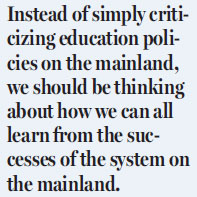World Choir Games a wake-up call for HK
Updated: 2018-09-17 07:33
By Benedict Law(HK Edition)
|
|||||||||
This summer, I headed to Pretoria, South Africa to participate in the World Choir Games as a member of the Senior Mixed Voice Choir of my alma mater, St. Paul's Co-educational College (SPCC). Our choir was extremely confident going into the competition, to the extent that we treated one of the categories - Youth Mixed Choir - as the "home game of all home games", entering the prize-giving ceremony with our heads held high and awaiting the gold medal shimmering magnificently on the stage. As the judges announced the winner of the second prize, we all became very excited. But, to our horror, they declared the name of our school, before announcing that of the winner: Guangdong Experimental High School (GEHS).
When I got back to our hotel that night, I did some research on the winning school. Established in 1960, 45 years after SPCC, GEHS currently ranks as one of the six best high schools in Guangzhou. In recent years, its choir has received numerous awards from countries such as Australia, Austria, Japan, South Korea and Germany, and won no fewer than nine consecutive first prizes at the Interscholastic Chorus Competitions in Guangzhou. The choir's performance was also selected as the best program in the Awards Evening at the Great Hall of the People in Beijing in 2004.
For its part, SPCC is regarded as the top co-educational institution in Hong Kong. Its primary school receives about 3,900 applications every year, meaning that approximately 28 students compete for each place. The SPCC choir has an outstanding reputation, and going into the World Choir Games, we felt that nothing could block our road to success. So how did the Chinese mainland, a developing economy, produce a choir of such high quality that it could triumph over one of the most prestigious choirs in the 'Pearl of the Orient'?
Nowadays, top schools on the mainland - not only GEHS - are producing students with an extraordinary ability to compete at the highest level of competitions around the world. For instance, although the mainland has only been participating in the Universiade, an international sports competition for university students, since the 10th games in 1979, it has since beaten many nations which have previously won the competition, and has been the top winner in five out of the nine games held so far this century. Another example of the extraordinary ability of mainland students is their performance in the International Biology Olympiad, where five mainland students finished in the top 10 earlier this year.

It is not only the top students, however, who are excelling on the mainland now. According to PISA, a worldwide study evaluating the performance of 15-year-old students in science, mathematics and reading, mainland students achieve top scores in both science and mathematics, and above-average scores in reading. Only students from developed countries such as Canada, Finland and Australia can match these results.
Hong Kong, which is assessed independently by PISA, also achieves top results in science and mathematics, and in reading as well. However, the results have seen a slight decline in the past two decades. Does this mean that the education system here is not adapting sufficiently to the rapid developments of the 21st century? Perhaps not. But it does suggest that instead of simply criticizing education policies on the mainland, we should be thinking about how we can all learn from the successes of the system on the mainland.
These successes are not, of course, limited to the field of education. According to Global Finance magazine, the average year-on-year GDP growth on the Chinese mainland was a whopping 8.2 percent between 2008 and 2017, while three mainland companies - State Grid, Sinopec Group and China National Petroleum - were listed by Fortune in last year's top five companies in the world by total revenue. China has also emerged as a space superpower, with Thesis Scientist ranking its space agency eighth in the world, ahead of those of both Canada and India.
Despite all these successes, however, many people in Hong Kong continue to look down on the rest of China. This is a parochial attitude which is not only ignorant but also short-sighted. For if we continue to view our compatriots on the mainland with a superiority complex, we will one day look up and find that we have been overtaken by them in most academic parameters. The natural consequence of this is its impact on our graduates' competitiveness in the workplace, which is becoming increasingly borderless.
This is one of the fundamental lessons I learned from the World Choir Games. The Chinese mainland is no longer emerging on the international stage; it is already there, front and center. And here in Hong Kong, we must accept this fact and take pride in and learn from it. What is more, we must learn to appreciate the incredible transformation that has taken place on the mainland in recent decades. For in doing so, we will be taking a major step toward an overdue transformation of our own and wake up from this reverie over our past glories!
The author is a music scholar at Eton College. He previously studied at St. Paul's Co-educational College in Central.
(HK Edition 09/17/2018 page9)